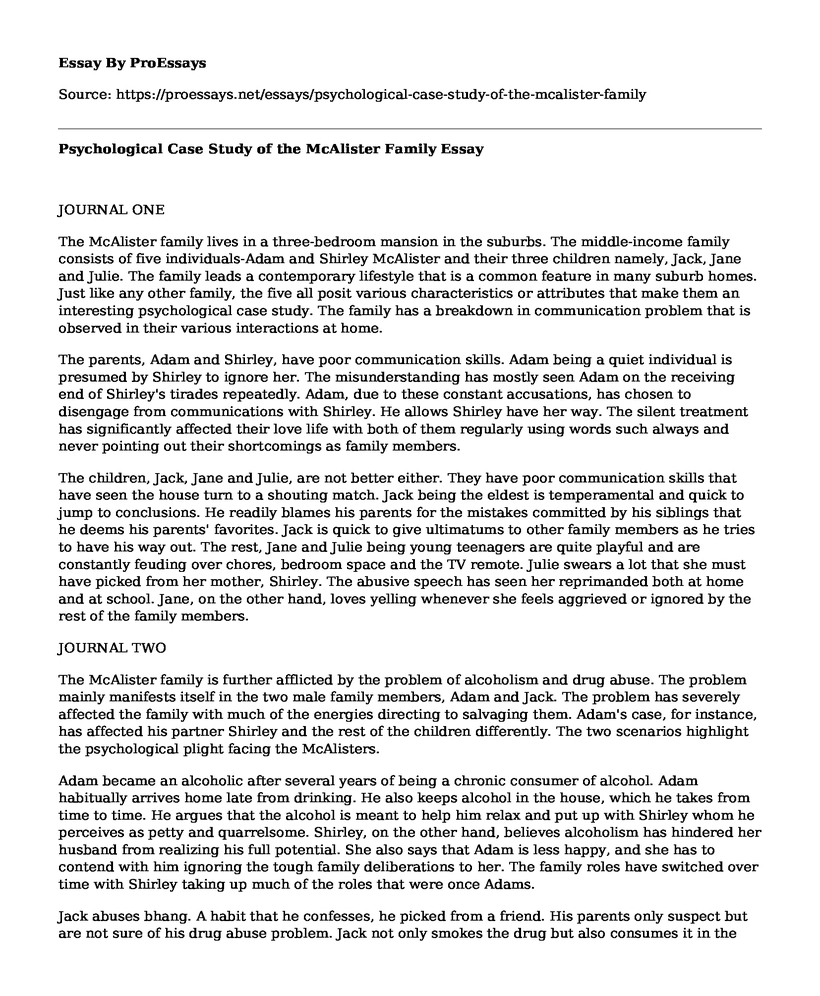JOURNAL ONE
The McAlister family lives in a three-bedroom mansion in the suburbs. The middle-income family consists of five individuals-Adam and Shirley McAlister and their three children namely, Jack, Jane and Julie. The family leads a contemporary lifestyle that is a common feature in many suburb homes. Just like any other family, the five all posit various characteristics or attributes that make them an interesting psychological case study. The family has a breakdown in communication problem that is observed in their various interactions at home.
The parents, Adam and Shirley, have poor communication skills. Adam being a quiet individual is presumed by Shirley to ignore her. The misunderstanding has mostly seen Adam on the receiving end of Shirley's tirades repeatedly. Adam, due to these constant accusations, has chosen to disengage from communications with Shirley. He allows Shirley have her way. The silent treatment has significantly affected their love life with both of them regularly using words such always and never pointing out their shortcomings as family members.
The children, Jack, Jane and Julie, are not better either. They have poor communication skills that have seen the house turn to a shouting match. Jack being the eldest is temperamental and quick to jump to conclusions. He readily blames his parents for the mistakes committed by his siblings that he deems his parents' favorites. Jack is quick to give ultimatums to other family members as he tries to have his way out. The rest, Jane and Julie being young teenagers are quite playful and are constantly feuding over chores, bedroom space and the TV remote. Julie swears a lot that she must have picked from her mother, Shirley. The abusive speech has seen her reprimanded both at home and at school. Jane, on the other hand, loves yelling whenever she feels aggrieved or ignored by the rest of the family members.
JOURNAL TWO
The McAlister family is further afflicted by the problem of alcoholism and drug abuse. The problem mainly manifests itself in the two male family members, Adam and Jack. The problem has severely affected the family with much of the energies directing to salvaging them. Adam's case, for instance, has affected his partner Shirley and the rest of the children differently. The two scenarios highlight the psychological plight facing the McAlisters.
Adam became an alcoholic after several years of being a chronic consumer of alcohol. Adam habitually arrives home late from drinking. He also keeps alcohol in the house, which he takes from time to time. He argues that the alcohol is meant to help him relax and put up with Shirley whom he perceives as petty and quarrelsome. Shirley, on the other hand, believes alcoholism has hindered her husband from realizing his full potential. She also says that Adam is less happy, and she has to contend with him ignoring the tough family deliberations to her. The family roles have switched over time with Shirley taking up much of the roles that were once Adams.
Jack abuses bhang. A habit that he confesses, he picked from a friend. His parents only suspect but are not sure of his drug abuse problem. Jack not only smokes the drug but also consumes it in the form of cakes and cookies. The pro side of the latter is that they are undetectable and easy to carry even past the school gates. The high from the drugs, in Jack's opinion, allow him to escape the struggles surrounding as an individual. He also cites that the bhang enhances his creativity and outlook on life.
Cite this page
Psychological Case Study of the McAlister Family. (2021, Mar 03). Retrieved from https://proessays.net/essays/psychological-case-study-of-the-mcalister-family
If you are the original author of this essay and no longer wish to have it published on the ProEssays website, please click below to request its removal:
- Analysing Financial Information
- The Influence of Capitalism on Gender Relations Essay
- Essay Example on Addiction: The Automatic Behavior of Alcohol & Drug Abuse
- Essay Sample on Homeless to Harvard: The Inspiring True Story of Elizabeth Murray
- Essay Sample on Hart-Cellar Act 1965: Reuniting Families & Attracting Skilled Labor
- Essay Example on Beauty Beyond Looks: A Reflection on Definition
- Paper Sample on Gender Inequality: A Review of Male Dominance and Present-Day Solutions







